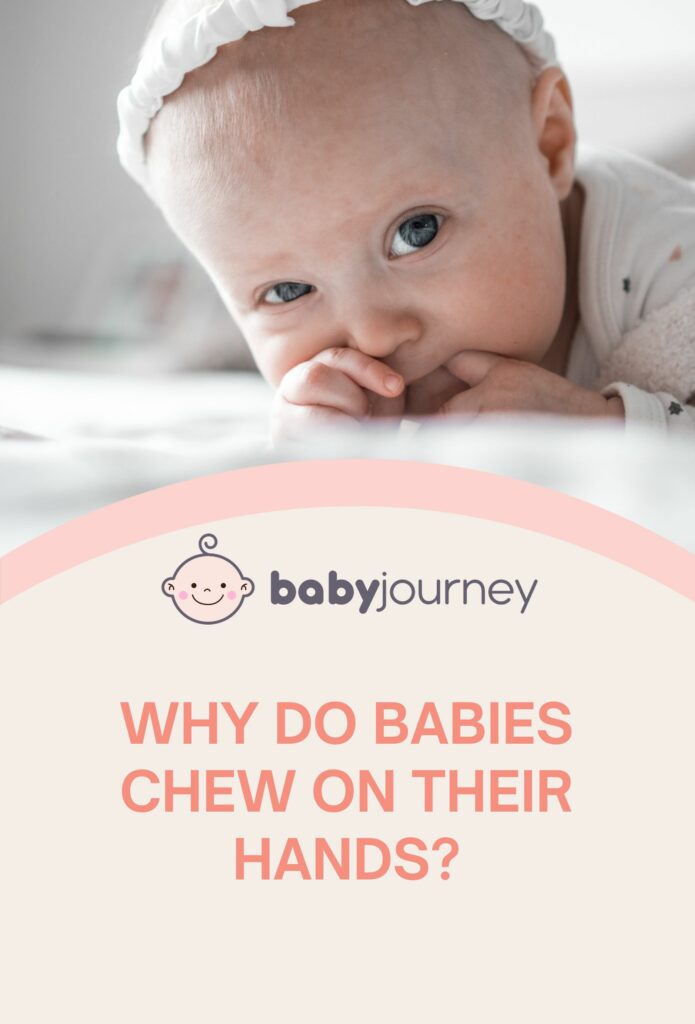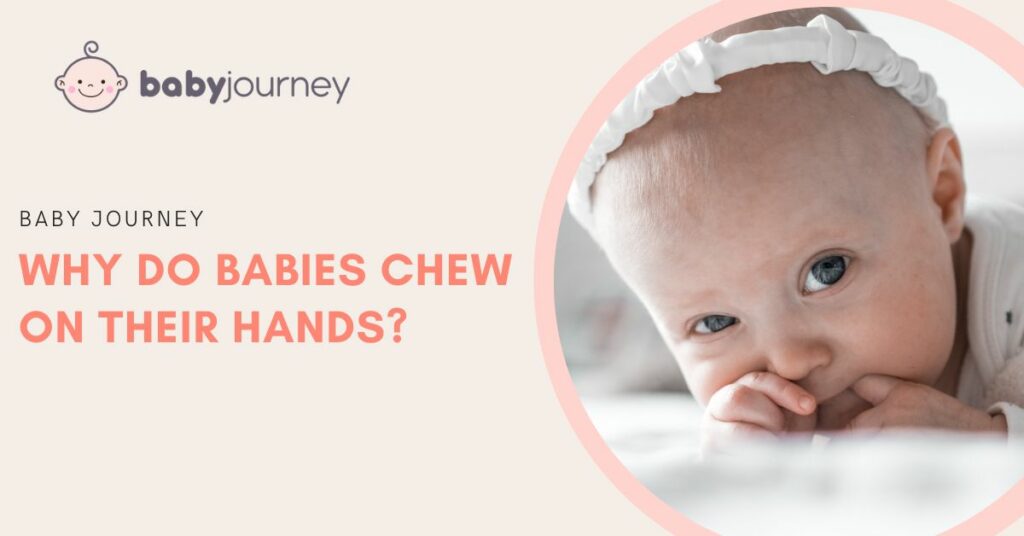Why do babies put their hands in their mouth? Babies are known for putting everything in their mouths, including their own hands. Many parents may wonder why their little ones are constantly chewing and sucking on their hand or finger. The answer is quite simple: babies are exploring their bodies and developing their senses.
According to pediatricians, babies are not born knowing how to control their bodies or the parts of their bodies. It takes a few months for them to discover their hands and realize that those hands are attached to the rest of their body. Once babies discover their hands, they will begin to put them in their mouths to explore them with the help of the sensory nerves in their tongue and lips.
While it may seem strange to adults, mouthing, sucking, and chewing are all ways that babies communicate their needs and current states of development. Babies’ little mouths are continuously working, whether it’s due to hunger, teething, or exploration. In the following article, we will explore the reasons why babies chew on their hands and what parents can do to help their little ones through this phase.
- Understanding Babies and Chewing
- Teething and Its Symptoms
- Age and Developmental Milestones
- Exploration and Discovery
- Hunger and Feeding
- Self-Soothing and Comforting Techniques
- Teething Toys and Other Alternatives
- Consulting a Pediatrician
- Babyproofing Your Home
- Understanding Babies' Behavior
- Conclusion
- Frequently Asked Questions
- Is it normal for babies to put their hands in their mouth?
- What are the reasons for babies chewing on their hands?
- Why do some babies chew on their hands more than others?
- How can I tell if my baby is hungry or just chewing on their hands?
- What are some tips for helping babies stop chewing on their hands?
- Can chewing on hands be a sign of teething in babies?
Understanding Babies and Chewing

Babies are known for chewing on their hands, fingers, and anything else they can get their mouths on. This behavior may seem strange or even concerning to parents, but it is actually a normal part of a baby’s development.
Babies explore the world around them through their senses, and their sense of touch is particularly important. Chewing on their hands and fingers allows babies to explore the texture and taste of their own bodies, which can be a fascinating experience for them.
In addition to being a way for babies to explore their world, hand chewing can also be a sign of hunger. Babies may put their hands in their mouths when they are hungry, signaling to their caregivers that it is time for a feeding.
It is important to note that hand chewing is not always a cause for concern. Most pediatricians agree that babies are not born knowing the parts of their bodies or how to control them. It takes time for babies to develop the motor skills necessary to intentionally move their hands and fingers. As babies grow and develop, they will eventually “find” their own hands and realize that those hands are attached to the rest of their body.
However, excessive hand chewing can be a sign of other issues, such as teething or oral discomfort. If a baby is chewing on their hands excessively and seems to be in pain or discomfort, it may be worth consulting a pediatrician to rule out any underlying issues.
Overall, hand chewing is a normal part of a baby’s development and should not be cause for concern in most cases. Caregivers should monitor their baby’s behavior and look for signs of hunger or discomfort, but should not worry too much if their baby enjoys chewing on their hands from time to time.
Teething and Its Symptoms
Teething is a natural process that occurs when a baby’s first teeth start to emerge through the gums. This process usually begins around four to seven months of age. Teething can be a difficult time for both the baby and the parents. The symptoms of teething can vary from baby to baby, but some common symptoms include:
- Swollen gums
- Pain or discomfort
- Drooling
- Fussiness or irritability
- Biting or chewing on objects
- Disturbed sleep patterns
When a baby is teething, they may try to find relief by chewing on their hands or fingers. This can help to alleviate the pain and discomfort caused by teething. As a result, it is not uncommon for babies to be seen with their hands in their mouth during this time.
It is crucial to remember that not every baby experiences teething symptoms. Some infants may find that teething comes quite easily, while others could feel more pain. If a baby is experiencing significant pain or discomfort during teething, it is important to talk to a pediatrician about ways to manage the symptoms.
Overall, teething is a natural process that can be difficult for babies and parents alike. By understanding the symptoms of teething, parents can help to alleviate their baby’s discomfort and ensure that they are getting the care they need during this important time.
Age and Developmental Milestones
Babies start exploring their world as soon as they are born, and one of the ways they do this is by putting things in their mouths. As they grow and develop, their curiosity and exploration continue, and this includes chewing on their hands.
Between the ages of 4 and 7 months, young babies often start teething, and this can lead to increased hand-chewing. However, most pediatricians concur that infants also gnaw on their hands for no other reason than that they have discovered them. The components of their bodies and how to govern them are not known to newborns. But ultimately, after a few months, they’ll “find” their own hands and understand that they’re connected to the rest of their body.
As babies grow and develop, they reach various developmental milestones that affect their motor skills, hand-eye coordination, and dexterity. By the age of 7 to 9 months, most babies can roll over in both directions, sit on their own, and even crawl across the room. They may also begin to scoot, rock back and forth, and grasp objects with their hands.
At around 12 months old, most babies can hold a cup with two hands and start to learn how to use utensils like spoons and forks. However, it’s important to remember that every baby develops at their own pace, and some babies may reach these milestones earlier or later than others.
Parents can help encourage their baby’s development by providing them with safe and age-appropriate toys and activities that promote exploration and physical development. It’s also essential to create a safe environment for babies to explore and play in, as this can help build their confidence and independence.
Exploration and Discovery
Babies are naturally curious and are constantly exploring their environment. One of the ways they do this is by putting objects in their mouth. This behavior is known as mouthing and it helps babies learn about the world around them.
When the babies suck and chew on their hands, they are exploring their own body. They are discovering that they have control over their hands and that their hands are a part of their body. This is an important milestone in their development and helps them understand the concept of self.
Babies also use their senses to explore their environment. They are particularly sensitive to colors, music, and other sensory stimuli. Chewing on their hands can provide a tactile sensation that helps them explore their sense of touch.
Parents can encourage their babies to explore their hands and mouth by providing them with textured teething toys. These toys can help babies develop their sense of touch and provide a safe and appropriate object for mouthing.
It is important for parents to supervise their babies during playtime to ensure that they are not putting anything dangerous in their mouth. By providing a safe and stimulating environment, parents can help their babies develop their senses and explore the world around them.
Hunger and Feeding
Babies often chew on their hands as a sign of hunger. Hunger cues can be difficult to identify, especially for first-time parents. However, recognizing these cues is important for ensuring that the baby is fed on time and adequately.
Hunger cues can vary from one baby to the next, but some common cues include chewing on hands, opening their mouth, turning their head towards the breast or bottle, smacking or licking their lips, and clenching their hands. It is essential to recognize these cues and feed the baby before they start crying, which is a late sign of hunger.
Breastfeeding is the most recommended and natural way to feed a baby. However, some mothers may choose to bottle-feed their babies due to various reasons. It is essential to ensure that the baby is getting enough milk during feedings, whether breastfeeding or bottle-feeding.
Babies have small stomachs and need to feed frequently. Newborns may need to feed every 2-3 hours, while older babies may feed every 3-4 hours. It is important to follow the baby’s cues and feed them on demand, rather than sticking to a strict feeding schedule.
In summary, recognizing hunger cues is crucial for feeding babies adequately. Whether breastfeeding or bottle-feeding, it is important to ensure that the baby is getting enough milk during feedings. Following the baby’s cues and feeding them on demand is essential for their growth and development.
Self-Soothing and Comforting Techniques
Babies often find comfort in self-soothing techniques, which can include sucking on their hands. This behavior can help them to relax and even prepare for sleep. It is a natural part of development and can be a sign that the baby is learning to regulate their emotions and calm themselves down.
Parents can encourage self-soothing by providing their baby with age-appropriate objects, such as pacifiers, soft toys, or blankets. These objects can help the baby to feel secure and comforted, especially when they are feeling upset or anxious.
Cuddling and holding the baby close can also be effective in soothing them. This physical contact can help the baby to feel safe and secure, and can provide a sense of comfort and warmth.
It is important to note that self-soothing techniques can vary depending on the age of the baby. For younger babies, sucking on their hands may be a sign of hunger and may indicate that they are ready for their next meal. As babies get older, they may use self-soothing techniques to deal with stress or anxiety.
Parents should pay attention to their baby’s cues and adjust their soothing techniques accordingly. If the baby seems to be uncomfortable or upset, it may be helpful to try a different approach, such as changing their position or providing them with a different object to suck on.
In summary, self-soothing techniques, such as sucking on their hands, can be a natural and effective way for babies to regulate their emotions and calm themselves down. Parents can encourage self-soothing by providing their baby with age-appropriate objects and physical contact, such as cuddling and holding. By paying attention to their baby’s cues and adjusting their soothing techniques accordingly, parents can help their baby to feel safe and secure, and to develop healthy self-soothing habits.
Teething Toys and Other Alternatives
When babies start teething, they often feel discomfort and pain, leading them to chew on their hands or other objects. Providing teething toys or other alternatives can help soothe their gums and alleviate the pain. Here are some options to consider:
- Teething toys: These are specially designed toys that babies can chew on to relieve teething pain. They are typically made of soft, chewable materials like silicone, rubber, or plastic. Some teething toys can be chilled in the refrigerator to provide additional relief for sore gums. It is important to choose teething toys that are age-appropriate and free of any harmful chemicals or choking hazards.
- Teething rings: Similar to teething toys, teething rings are circular in shape and can be chewed on to relieve teething pain. They are often made of hard plastic or rubber and can be chilled in the refrigerator. Some teething rings also have ridges or bumps to massage the gums.
- Teethers: Teethers are another type of teething toy that can be chewed on to relieve teething pain. They are typically made of soft, chewable materials like silicone or rubber and come in various shapes and sizes. Some teethers also have different textures or ridges to provide additional relief for sore gums.
- Other alternatives: Some parents may prefer to use natural alternatives to soothe teething pain. For example, a clean, damp washcloth can be chilled in the refrigerator and then given to the baby to chew on. Some parents also use frozen fruits or vegetables like bananas or carrots as a natural teething remedy. However, it is important to supervise the baby closely to prevent choking.
Overall, providing teething toys or other alternatives can help alleviate teething pain and prevent babies from chewing on their hands or other objects. It is important to choose age-appropriate and safe options and to supervise the baby closely during use.
Consulting a Pediatrician
If parents are concerned about their baby’s hand-chewing behavior, they should consider consulting a pediatrician. Pediatricians are trained professionals who can provide valuable insight into a baby’s development and behavior.
Pediatricians can help parents determine if hand-chewing is a sign of a developmental issue or if it is a normal part of a baby’s growth and development. They can also provide advice on how to manage the behavior and offer tips on how to soothe a teething baby.
During a visit with a pediatrician, parents can expect to discuss their baby’s overall health and development, including their eating and sleeping habits, and any concerns they may have about their baby’s behavior. The pediatrician may also examine the baby’s mouth and gums to check for signs of teething or other issues.
Pediatricians may recommend different strategies for managing hand-chewing behavior, such as providing teething toys or using a teething gel. They may also suggest ways to soothe a teething baby, such as giving them a cold washcloth to chew on or using infant pain relievers.
Overall, consulting a pediatrician can provide parents with peace of mind and valuable information about their baby’s development and behavior. If parents have any concerns about their baby’s hand-chewing behavior, they should not hesitate to schedule an appointment with their pediatrician.
Babyproofing Your Home
When it comes to babyproofing your home, it’s important to take a comprehensive approach. Babies are curious and can get into everything, so it’s crucial to ensure that your home is a safe environment for them to explore. Here are a few things to keep in mind as you babyproof your home:
- Secure furniture and appliances: Make sure that all furniture and appliances are securely anchored to the wall to prevent them from tipping over. This includes bookcases, dressers, and televisions.
- Cover electrical outlets: Electrical outlets can be a hazard for curious babies. Use outlet covers or safety plugs to keep little fingers out of harm’s way.
- Block off stairs: If you have stairs in your home, use baby gates to block them off and prevent falls.
- Lock cabinets and drawers: Cabinets and drawers can contain hazardous materials or sharp objects. Use childproof locks to keep babies out of these areas.
- Remove choking hazards: Babies put everything in their mouths, so it’s important to remove any small objects that could be a choking hazard. This includes coins, buttons, and small toys.
- Keep cords out of reach: Electrical cords can be a strangulation hazard for babies. Keep cords out of reach or use cord covers to keep them safe.
By taking these steps to babyproof your home, you can create a safe and secure environment for your little one to explore and grow in.
Understanding Babies’ Behavior
Babies are known for their curious and unpredictable behavior, and chewing on their hands is no exception. While it may seem strange or even concerning to some parents, it is actually a common behavior among babies. Understanding why babies chew on their hands can help parents better understand their child’s needs and behaviors.
One reason why babies chew on their hands is simply due to boredom. Babies are naturally curious and crave stimulation, and when they do not receive enough stimulation, they may resort to chewing on their hands as a way to occupy themselves. However, it is important to note that not all hand-chewing is a sign of boredom.
Another reason why babies may chew on their hands is because they are overstimulated. Overstimulation can cause stress and anxiety in babies, and chewing on their hands may be a way to self-soothe and calm themselves down.
Stress is another factor that can contribute to hand-chewing in babies. Babies can experience stress just like adults, and they may use hand-chewing as a way to cope with their stress and anxiety.
In some cases, hand-chewing may also be a reflex for babies. Babies are born with a natural instinct to suck, and hand-chewing may be a way to satisfy that instinct.
Overall, there are several reasons why babies may chew on their hands, and it is important for parents to understand their child’s behavior in order to provide the appropriate care and attention. By observing and understanding their child’s behavior, parents can better meet their child’s needs and promote healthy development.
Conclusion
In conclusion, babies chew on their hands for various reasons, including hunger, teething, self-soothing, and exploration. It is a natural reflex for babies to put things in their mouths, and hand-chewing is no exception.
Parents should not worry too much if they observe their baby chewing on their hands, as long as the baby’s hands are clean to avoid any potential infections. However, if the baby is constantly sucking on their hands, it may be a sign that they need some stimulation or attention.
It is essential for parents to understand their baby’s hand-sucking habits and be aware of any changes in their eating or sleeping patterns, as this could indicate an underlying medical condition. If the baby is excessively fussy or crying, it is crucial to check if they are hungry or need a diaper change before assuming that they are simply chewing on their hands.
Overall, babies chewing on their hands is a normal and healthy behavior, and parents should not be overly concerned about it. As long as they provide their baby with the necessary care and attention, the baby will develop well and grow into a healthy child.
Frequently Asked Questions
Is it normal for babies to put their hands in their mouth?
Yes, it is normal for babies to put their hands in their mouth. Babies explore the world around them through their senses, including taste and touch. Putting their hands in their mouth is a way for babies to explore and learn about their bodies.
What are the reasons for babies chewing on their hands?
Babies chew on their hands for various reasons. It could be a sign of hunger, teething, or simply a way to self-soothe. Babies may also chew on their hands when they are bored or tired.
Why do some babies chew on their hands more than others?
Some babies may chew on their hands more than others due to their temperament or individual needs. Some babies may have a stronger need for oral stimulation, while others may not.
How can I tell if my baby is hungry or just chewing on their hands?
If your baby is chewing on their hands and showing signs of hunger, such as fussiness or rooting, they may be hungry. However, if your baby is content and not showing any signs of hunger, they may just be self-soothing.
What are some tips for helping babies stop chewing on their hands?
Offering your baby a teething toy or a clean, cold washcloth to chew on can help redirect their chewing behavior. Providing other forms of sensory stimulation, such as singing or playing with toys, can also help distract your baby from chewing on their hands.
Can chewing on hands be a sign of teething in babies?
Yes, chewing on hands can be a sign of teething in babies. Teething can cause discomfort and pain in a baby’s gums, which can lead to increased chewing behavior. If your baby is exhibiting other signs of teething, such as drooling or irritability, it may be a sign that they are teething.




